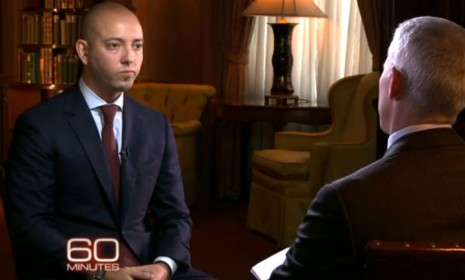Why I Left Goldman Sachs: Is the bank's most famous quitter a con man?
Greg Smith famously left the investment bank with guns blazing. But his new book reportedly fails to back up his provocative claims

A free daily email with the biggest news stories of the day – and the best features from TheWeek.com
You are now subscribed
Your newsletter sign-up was successful
In March, Greg Smith lit up the financial world with an eye-catching op-ed in The New York Times titled "Why I am leaving Goldman Sachs." Smith, a former vice president at the company, decried the "toxic and destructive" environment at Goldman, which he said was so obsessed with profits that it no longer worked in the interest of its clients. Smith charged that inside Goldman, these less-savvy clients were derided as "muppets" who you could sell on financial products that were bad for investors but good for Goldman. (Goldman is currently battling a nearly identical charge in court.) Now, Smith is on the verge of releasing a tell-all book about the company titled Why I Left Goldman Sachs, which has already been reviewed by several journalists. Andrew Ross Sorkin, a financial journalist at the Times, said Smith doesn't have much to say, and may have "conned" the Times into publishing his op-ed. Meanwhile, Goldman has released internal documents showing that Smith left because he was denied a yearly pay package of $1 million, double what he previously made. Is Smith nothing more than a con man?
Yes. Smith is full of it: Goldman's document dump show that Smith "is nothing more than a sweet-talking con man," says William D. Cohan at Bloomberg. "He conned the Times into thinking he was resigning from Goldman Sachs on principle, when he was really nothing more than a disgruntled and ambitious former employee who wanted a bigger bonus and a bigger title and got, and merited, neither." Goldman isn't innocent: It's "always been a stinging scorpion." But Smith is pretending when he suggests that the "culture at Goldman Sachs had deteriorated during his 12-year tenure into something he no longer recognized."
"Greg Smith, another Wall Street con man"
The Week
Escape your echo chamber. Get the facts behind the news, plus analysis from multiple perspectives.

Sign up for The Week's Free Newsletters
From our morning news briefing to a weekly Good News Newsletter, get the best of The Week delivered directly to your inbox.
From our morning news briefing to a weekly Good News Newsletter, get the best of The Week delivered directly to your inbox.
And he offers no real evidence: "It's hard to quarrel with Mr. Smith's overriding message: Wall Street should put clients interests' first or risk oblivion," says James B. Stewart at the Times. "But stripped of its incendiary conclusions, Mr. Smith's manifesto was curiously short of facts." And his book is no different, failing to "deliver concrete examples to back up his sweeping conclusions." And he admits changing names of people to conceal their identities, which "makes it nearly impossible to verify much of what he says."
"Ex-Goldman executive's tell-all book falls short"
But Smith still has a point: Sure, there aren't any "scandalous revelations" in Smith's book, says Mark Gongloff at The Huffington Post. And "it still stretches the imagination that, in the decade-plus that Smith was with the firm, it changed from a place where clients were treated like gentle lambs into a vicious muppet slaughterhouse." But "what we may be missing amid all the laughter is the public service that Smith is doing." He's giving us a much-needed reminder that banks like Goldman are playing in a "casino where the game is rigged in favor of the house."
"Greg Smith's Goldman book portrays dystopian horror via cheesy anecdotes"
A free daily email with the biggest news stories of the day – and the best features from TheWeek.com
-
 Health insurance: Premiums soar as ACA subsidies end
Health insurance: Premiums soar as ACA subsidies endFeature 1.4 million people have dropped coverage
-
 Anthropic: AI triggers the ‘SaaSpocalypse’
Anthropic: AI triggers the ‘SaaSpocalypse’Feature A grim reaper for software services?
-
 NIH director Bhattacharya tapped as acting CDC head
NIH director Bhattacharya tapped as acting CDC headSpeed Read Jay Bhattacharya, a critic of the CDC’s Covid-19 response, will now lead the Centers for Disease Control and Prevention